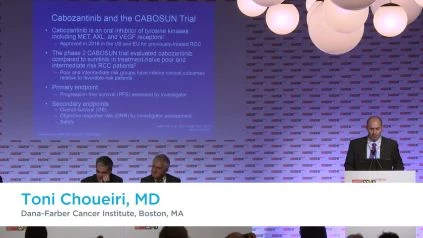Toni Choueiri, MD of Dana-Farber Cancer Institute, Boston, MA gives a press brief about the results of the CABOSUN trial of cabozantinib compared to sunitinib in treatment naive poor and intermediate risk renal-cell carcinoma (RCC) patients (NCT01835158) at the 2016 annual meeting of the European Society of Medical Oncology (ESMO), held in Copenhagen, Denmark. Dr Choueiri explains that cabozantinib is an oral inhibitor of tyrosine kinases. The primary endpoint of the trial was progression-free survival (PFS) and secondary endpoint was overall survival (OS), objective response rate (ORR) and safety. He explains that treatment with cabozantinib resulted in median PFS of 8.2 months compared to 5.6 arms with the control arm of sunitinib. ORR was 46% for cabozantinib compared to 18% for sunitinib. OS is preliminary; median OS with cabozantinib is 30.3 months compared to 21.8 months for sunitinib. They intend to have an update on OS within the next months. In terms of safety, occurence of grade 3/4 events was not different and discontinuation around 20% for both drugs. There were no suprises in terms of side effects, which include hypertension, diarrhea, PPE and fatigue. Further, there was a greater exposure in the cabozantinib arm. He then explains the implications; sunitinib is a standard of care therapy in first-line in metastatic RCC and as cabozantinib improved PFS and ORR, he believes that it presents a potential first-line treatment in patients with advanced RCC.
[the_ad id="32629"]

